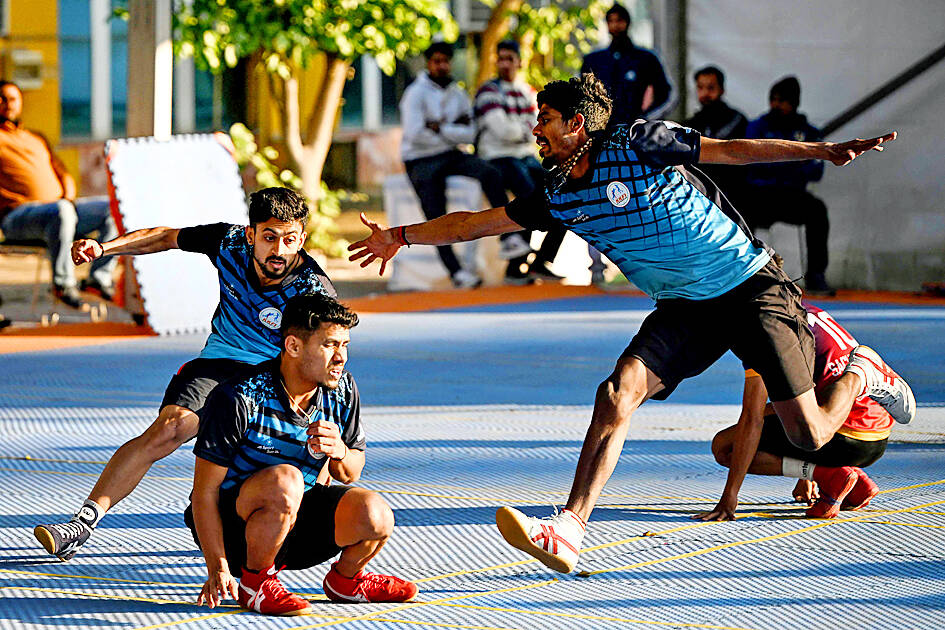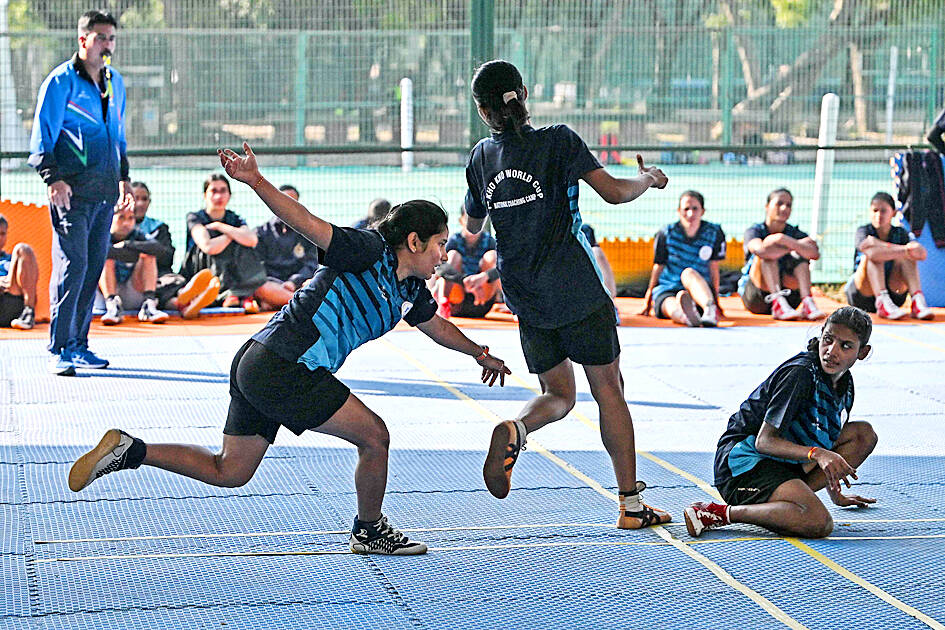The ancient game of kho kho is enjoying a resurgence in India, with organizers of the first international tournament hoping their efforts would secure the sport’s place in the Olympics.
Kho kho, a catch-me-if-you-can tag sport, has been played for more than 2,000 years across southern Asia, but its rules were not formalized until the early 20th century.
It was played as a demonstration sport at the 1936 Olympics in Berlin, but did not gather enough support to be included in the Summer Games and since then has been largely eclipsed by India’s ferocious love of cricket.

Photo: AFP
Nearly a century later, enthusiasts have sought to raise its profile with the inaugural Kho Kho World Cup featuring teams from 23 nations competing in India’s capital, New Delhi.
The tournament’s opening ceremony featured a gala of song, dance and an Olympic-style team parade, reflecting the aspirations of organizers and athletes to take the sport global.
“My elder sister played the sport, but was not able to pursue her dreams,” Indian women’s team player Nasreen Shaikh, 26, said. “We have crossed the first barrier of playing in a World Cup. The next big step would be an entry in the Olympics.”

Photo: AFP
Kho kho is traditionally played outside on a rectangular court, divided in two by a line that connects two poles at either end of the field.
Teams switch between attack and defense, with the former chasing and tagging defending players around the field.
Only one player can give chase at a time and attacking players can only move in one direction around the court, forcing them to tag in teammates crouched on the center line to take over pursuit.
The match is won by whichever team can gain the most points, primarily by tagging defenders faster than the opposing team.
The franchise-based Ultimate Kho Kho League, founded in 2022, brought the sport off grassy fields and onto indoor mats, also boosting its profile with a television audience.
Since then the league has become the third most-watched non-cricket sports tournament in the world’s most populous country after the Pro Kabaddi League — another ancient Indian tag sport — and the Indian Super League soccer competition.
“The turning point was when it transitioned from mud to mat. It made it into a global game,” Kho Kho Federation of India president Sudhanshu Mittal said. “Today we are in 55 countries... Native players in countries like Germany, Brazil and Kenya are embracing the game because of its speed, agility and minimal equipment required.”
Mittal said he expected the sport to gain a foothold in dozens more countries by the end of the year, giving it a strong claim to be featured in the Olympics in the coming decade. That would coincide with India’s audacious bid to host the 2036 Games in Ahmedabad, 100 years after kho kho last appeared at the Olympics.
The US, England and Australia were among the nations competing in the World Cup, with expatriate Indians heavily represented after taking the game to foreign shores.
The men’s and women’s Indian and Nepalese teams were last night after press time to face off in their respective finals.
Pakistan was a glaring omission from the competition despite the sport being popular there — a reflection of the deep animosity between the nuclear-armed archrivals.
World Cup organizers have refused to comment on the absence, which failed to dim the sense of optimism at the competition that the sport is destined to thrive.
“There has been a sea change in the sport,” Indian men’s team captain Pratik Waikar, 32, said.
“Cricket has a rich history and they developed it well by going live on TV, and now our sport has also gone live,” he said. “In the next five years it will be on another level.”
Additional reporting by staff writer

College basketballer Kaitlyn Chen has become the first female player of Taiwanese descent to be drafted by a WNBA team, after the Golden State Valkyries selected her in the third and final round of the league’s draft on Monday. Chen, a point guard who played her first three seasons in college for Princeton University, transferred to the University of Connecticut (UConn) for her final season, which culminated in a national championship earlier this month. While at Princeton, Chen was named the Ivy League tournament’s most outstanding player three times from 2022 to last year. Prior to the draft, ESPN described Chen as

College basketballer Kaitlyn Chen (陳凱玲) has become the first player of Taiwanese descent to be drafted by a WNBA team, after being selected by the Golden State Valkyries in the third and final round of the league's draft yesterday. Chen, a point guard who played her first three seasons in college for Princeton University, transferred to the University of Connecticut (UConn) for her final season, which culminated in a national championship on April 6. While at Princeton, Chen was named the Ivy League tournament's most outstanding player three times from 2022 to last year. Prior to the draft, ESPN described Chen as a

Robinson Cano spent 17 seasons playing in the MLB in front of all kinds of baseball fans, but he said there is something special about his stint with the Mexican Baseball League’s Diablos Rojos. He is not alone. The league last week opened its 100th season, aiming to keep an impressive growth in attendance that began after the national team’s surprise run at the 2023 World Baseball Classic, and is already surpassing some first-division soccer clubs. After finishing third in the 2023 tournament, many casual fans, some of them soccer enthusiasts disappointed after Mexico were eliminated in the first round in the 2022

Kumar Rocker, a first-round pick in both the 2021 and 2022 drafts, on Thursday won for the first time in the major leagues. Rocker struck out a career-best eight in a career-best seven innings as the Texas Rangers beat the Los Angeles Angels 5-3 to complete a three-game sweep. Rocker (1-2) threw a career-high 78 pitches and allowed three runs on five hits without a walk. The 25-year-old right-hander was drafted third overall by Texas in 2022, a year after concerns over a physical led to him going unsigned by the New York Mets as the 10th overall pick. He made his major